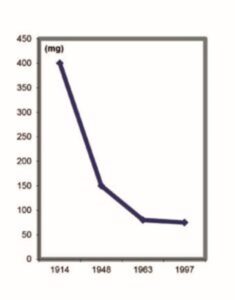Magnesium Bisglycinate Tablets
Magnesium Bisglycinate Tablets
- During daytime fatigue: Magnesium is beneficial for tiredness and fatigue.
- Maintain a healthy nervous system: Magnesium supports the nervous system.
- Promote an active lifestyle: Magnesium supports normal energy metabolism.
Description
Why is magnesium supplementation important?
Magnesium is widely regarded as the most crucial mineral to add to one’s diet as a supplement. In the body, we see that magnesium is necessary for over 300 enzymatic reactions. Increasing evidence confirms that nearly two-thirds of the population in the Western world do not meet the recommended daily intake of magnesium. This is 320 mg per day for women and 420 mg per day for men.
Magnesium is abundant in unprocessed, organic foods in nature. Research by Paul Berger indicates that in the previous century (1914-1997), the mineral content of foods decreased on average by a factor of 5 (!). The reason for this decline is the rise of intensive agriculture, where agricultural lands are selectively fertilized with synthetic fertilizers, containing a limited number of minerals. As for all other minerals and trace elements, these agricultural lands are slowly depleted.
Figure: The average mineral content in vegetables in the USA during the previous century. The figure shows the combined averages of calcium, magnesium, and iron in vegetables such as cabbage, lettuce, tomatoes, and spinach. (Bergner 1997: The Healing Power of Minerals.)
The use of synthetic fertilizers is not the only factor influencing magnesium intake; namely:
- The most common staple foods such as meat (18-29 mg/100 g), sugar (0 mg/100 g), and white flour (20 mg/100 g) contribute less than 20% to the daily magnesium requirement, thus being a limited source of magnesium.
- When a product is cooked, magnesium is largely lost.
- Magnesium absorption can be poor in case of vitamin D deficiency, a common issue in Western cultures.
- In addition to the use of synthetic fertilizers, some commonly used pesticides can affect minerals, reducing magnesium content in crops.
- Cigarette smoking decreases magnesium concentration in blood plasma.
- Commonly used medications (such as some antibiotics, antacids, and medications for high blood pressure) reduce magnesium absorbability.
- Age: Magnesium absorption decreases by up to 30% with aging.
A chronically low intake of magnesium may be the primary reason for magnesium deficiency throughout the body. However, there are other factors that can influence the total amount of magnesium in the body.
What is the biological availability of magnesium?
In all magnesium supplements on the market, magnesium is combined with another substance. Each combined form delivers different amounts of elemental magnesium. The amount of magnesium and its biological availability influence the absorption of the supplement.
When referring to biological availability, it means the amount of elemental magnesium that is actually absorbed by the body. In short: the amount of magnesium absorbed by the tissues is based on how easily the magnesium dissolves in the body and how much elemental (or ionic) magnesium is released.
The combined form of magnesium is a significant factor affecting absorption efficiency. There are two groups of magnesium compounds: organic and inorganic. Organic forms often contain C-H bonds and are often associated with living organisms. Inorganic forms include salts, metals, minerals, and other compounds that are carbon-free.
There are many organic magnesium compounds. Examples include magnesium bound to amino acids, such as magnesium acetyltaurate, magnesium bisglycinate, or magnesium bound to malic or citric acid, such as magnesium citrate, malate.
Absorption of ‘cheap’ magnesium
Although magnesium oxide has the highest elemental magnesium content (60%), it cannot ionize well, leading to poor absorption. In a 500mg magnesium oxide capsule, only about 4% is absorbed in the intestine, resulting in approximately 12mg of magnesium. Magnesium oxide is common in low-quality supplements simply because it is inexpensive.
The poor absorption is due to the molecular structure. When magnesium oxide reaches the stomach, the mineral cannot be effectively dissociated from its chemical structure due to the acidic environment of the stomach. Consequently, it becomes difficult to absorb. Subsequently, magnesium oxide competes with other minerals (mainly calcium) to be absorbed into the intestinal mucosa.
Allowed health claims:
- Magnesium supports energy levels.
- Magnesium may help with fatigue.
- Magnesium is important for normal muscle function and plays a role in maintaining flexible and strong muscles.
- Magnesium plays a role in cell and tissue formation.
- Magnesium helps in building proteins in the body.
- Magnesium is involved in bone formation and is important for maintaining strong bones and teeth.
- Magnesium is beneficial for mood, concentration, and memory.
- Magnesium has a positive effect on the functioning of the nervous system.
- Magnesium contributes to a good electrolyte balance.
With emphasis noted:
Due to legal restrictions, not all details about this dietary supplement can be provided. However, for further inquiries, we are reachable at: +31 (0)70-345-0290.
Composition
Magnesium Bisglycinate Tablets by Kala Health contain the following ingredient:
Ingredients
1 tablet contains: | %RI* | |
|---|---|---|
| Magnesium Bisglycinate | 200 mg | 53% |
*RI = Reference Intake: The Reference Intake indicates how much of a specific nutrient an average adult needs daily. This value can vary depending on factors such as age, gender, and health condition.
Ingredients: Magnesium Bisglycinate, bulking agent (microcrystalline cellulose), bioflavonoids, anti-caking agent (rice extract, rice concentrate), coating agent hydroxypropylmethylcellulose, stearic acid, glycerin, carnauba wax.
Guaranteed free from: Preservatives, synthetic fragrances, artificial colors, and flavors.
Use & dosage
Recommended use
| For whom: | Daily dosage: |
|---|---|
| Adults | 1 to 2 tablets per day |
Daily Dosage: Adults 1 to 2 tablets per day, or as recommended. Preferably take during a meal. Adhere to the (recommended) daily dosage.
Mandatory statement: A dietary supplement is not a substitute for a varied diet. A varied, balanced diet and a healthy lifestyle are important. This product is a dietary supplement (contains magnesium).
Safety: Consult an expert before using supplements in case of pregnancy, lactation, medication use, and illness.
Storage advice
Storage Advice: Keep in a dry place at room temperature and out of reach of small children.










 60, 180 or 365 capsules
60, 180 or 365 capsules
 500 or 1000 gram
500 or 1000 gram
 60 or 180 licaps®
60 or 180 licaps®
